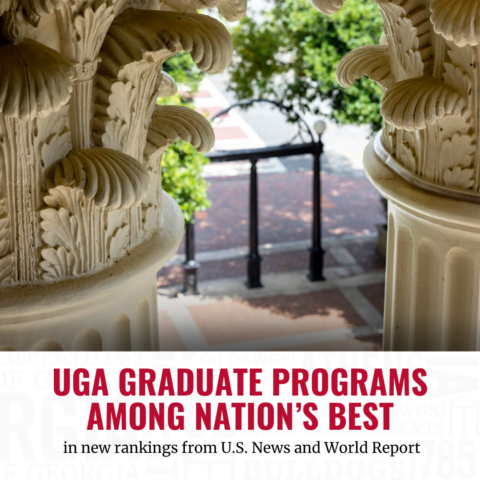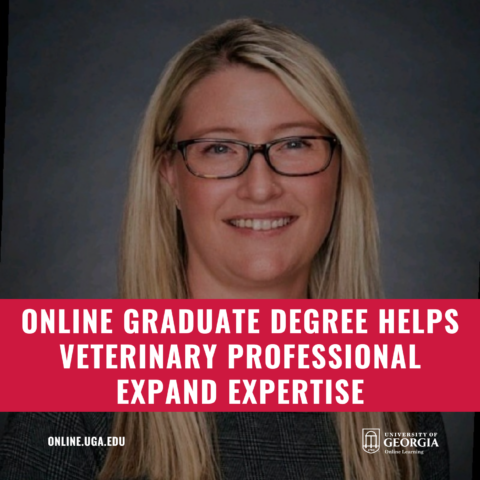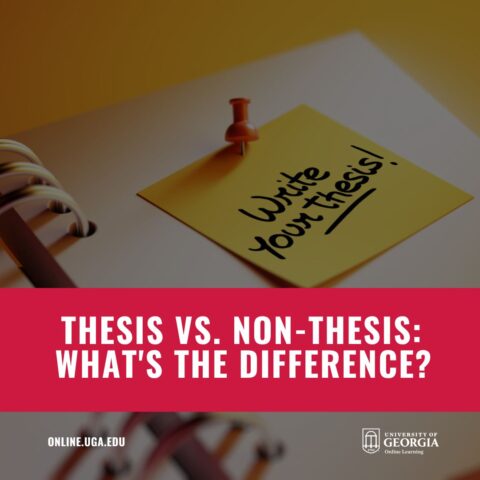Master of Science (M.S.) in Pharmacy – International Biomedical Regulatory Sciences
Master of Science (M.S.) in Pharmacy – International Biomedical Regulatory Sciences

I am committed to developing and mentoring the next generation of regulatory professionals.
Overview
The rapid expansion of pharmaceutical and biomedical products industries requires an increasing number of highly skilled regulatory science professionals. Often serving as company liaisons with the regulatory authorities, these professionals are responsible for ensuring that their companies are compliant with complex regulatory policies and procedures within the countries in which they operate. An online master’s in regulatory affairs, offered through the UGA College of Pharmacy, provides the credentials you need to serve in such capacities and advance your regulatory career in industries such as pharmaceuticals, biologics, medical devices, and veterinary medicine.
The program is a non-thesis/project master’s degree and is ideal for individuals who have a clear objective to pursue a career in regulatory affairs, as well as those with an industry background desiring an advanced education to thrive in regulatory management.
*A thesis option is available but will require additional time to complete.
What Career Options Are Available With An Online Master In Regulatory Sciences / Affairs?
Regulatory science professionals are employed in industry, government, and academia and provide a range of services related to the regulation, development, manufacturing, and marketing of pharmaceuticals, medical devices, in-vitro diagnostics, biologics, biotechnology, nutritional products, cosmetics, and veterinary products.
What Are The Benefits Of An Online Masters In Regulatory Sciences / Affairs?
Regulatory affairs/sciences is a multi-disciplinary field. By earning a master’s degree you can change your career, pursue advancement in your current role, or continue on to doctoral studies.
This online regulatory sciences master’s program provides a flexible and convenient way to earn a degree while still meeting the demands of your busy schedule. Online students are granted the same access to online resources, career services, library services, and technical support as all enrolled University of Georgia students to help ensure that you are equipped for success in every way.
What Are The Differences Between The Non-thesis and Thesis Tracks?
The non‐thesis pathway will engage you in the real‐world application, practice, development, and experiential learning needed for career success. These practical aspects of the job are highly desired by employers and the non‐thesis pathway is particularly suitable for students who do not plan to pursue research-intensive positions or continue on to doctoral studies.
The non-thesis path requires a minimum of 39 semester hours and includes an applied project or internship and a comprehensive examination.
The master’s thesis path demonstrates research competencies, involves direct original research experience, and strengthens your potential application to Ph.D. programs. A thesis may be especially valuable for work requiring research in cutting‐edge development companies.
This path requires a minimum of 38 semester hours and includes the development and oral defense of a research-based thesis.
What is the difference between a Thesis and Project (Non-Thesis)?
Why Choose the University of Georgia’s Online Master’s In Regulatory Sciences?
The University of Georgia’s online regulatory sciences master’s is unique in that it covers the requirements of both the medical and veterinary industries helping to ensure the development, manufacturing, and marketing of safe and effective medical products and therapies. Topics of study include pharmaceutical, biologic, medical devices, animal health, international regulations, and combination products as well as the management and monitoring of clinical trials.
As an online graduate of the University of Georgia, you become part of an extensive alumni network and a longstanding tradition of striving for excellence in every pursuit. For over two hundred years, we have been on a mission of leadership and service, and today, we are ranked #16 among the nation’s top public institutions by U.S. News & World Report.
Mission Statement
The Master of Science in Pharmacy comes with an emphasis in Regulatory Sciences Program prepares industry professionals for an advanced career in regulatory affairs management, covering comprehensive regulatory requirements for pharmaceuticals, biologics, medical devices, animal health, international regulations, and combination products. The master’s degree equips students with essential regulatory, scientific, and practical skills for medical product development, registration, and maintenance of medicinal drug products and medical devices.
Other online programs of interest
You also may be interested in these online programs:
Graduate Certificate Clinical Trials Design and Management
Graduate Certificate in Drug Safety and Pharmacovigilance
Graduate Certificate International Biomedical Regulatory Sciences
Graduate Certificate in Chemistry, Manufacturing & Controls
Mater of Science (M.S.) in Pharmacy, Clinical Trials Management
Accreditations
The University of Georgia is accredited by the Southern Association of Colleges and Schools Commission on Colleges (SACSCOC) to award baccalaureate, master’s, specialist, and doctoral degrees. The University of Georgia also may offer credentials such as certificates and diplomas at approved degree levels. Questions about the accreditation of the University of Georgia may be directed in writing to the Southern Association of Colleges and Schools Commission on Colleges at 1866 Southern Lane, Decatur, GA 30033-4097, by calling (404) 679-4500, or by using information available on SACSCOC’s website (www.sacscoc.org).
College of Pharmacy is accredited by the Accreditation Council for Pharmacy Education (ACPE).
Admissions
Credit and Transfer
Total Hours Required to Earn Degree: 38 – 39 (credit hours)
Maximum Hours Transferable into Program: 6
A maximum of 6 credits may be transferred into the program with Director’s approval. The International Biomedical Regulatory Sciences Graduate Education Program is a member of the Atlanta Regional Council for Higher Education (ARCHE), which allows students to register for approved courses at an approved ARCHE member institution.
M.S. in Pharmacy Admission Requirements
Students applying to the University of Georgia must be accepted by the Graduate School. Any student holding a bachelor’s degree from an institution accredited by the proper regional accrediting association is eligible to apply. Preference will be given to applicants with a degree in the sciences, healthcare, or engineering. Preference will also be given to applicants employed in the pharmaceutical, medical device, and biotechnology industries or a related field.
Application Checklist
- Application – Submit the Graduate School Admissions online. Application fee: $75 Domestic / $100 International.
- Select Campus – Online
- Select Intended Program –
- MS_PHRM_GWON: Thesis option
- MS_PHRM_GONT: Non-thesis Project option
- Select Area of Emphasis – Pharmaceutical and Biomedical Regulatory Affairs
- International Applicants must submit TOEFL or IELTS scores.
- Résumé or Curriculum Vita – Upload to the Graduate School application.
- Statement of Purpose – Submit a one-page statement of purpose online to the Graduate School through the application system. The statement of intent should clarify the candidate’s relevant background, interests, and goals in relation to the program.
- Transcripts – Submit unofficial transcripts from all institutions attended as part of the Graduate School application. Send official transcripts after you are offered admission.
- Letters of Recommendation – Submit three letters of recommendation online to graduate school. Letters should be from individuals who can evaluate your scholarly ability and potential for success in a graduate program. Preferably at least two of them are from faculty who have instructed the applicant in a previous program of study. The application will prompt your recommenders to submit their letters electronically.
- Professional or Academic Writing Sample:
- Not to exceed 5 pages
- Should cover a regulatory sciences topic of your choice
- This sample helps the department to evaluate your writing skills and determine your communication style. Be sure that your writing sample is grammatically correct and free of typographical errors and misspellings. Send the writing sample to the department along with your Personal Profile.
Interview with Department: Schedule your interview with the department and ensure that it takes place PRIOR to the application deadline.
Choose either the Thesis or Project model and make note of the proper program code in your UGA Graduate School application.
- MS_PHRM_GWON: Masters of Science Thesis option
- MS_PHRM_GONT: Masters of Science Project option
Application Deadlines
Domestic Applicants
- Fall: June 1
- Spring: November 1
International Applicants
- Fall: April 15
- Spring: October 15
- International Applicants – must submit TOEFL or IELTS scores.
Applications submitted after the application deadlines will be marked for the following semester. We will only consider completed applications.
There are no new admissions for summer semesters.
Click here to access the UGA Calendar system, including the Academic Calendars, Registration Calendars, Payment Dates, and Final Exam dates.
Cost
Tuition & Fees
Tuition rates and student fees may change each year.
Based on the 2024-25 credit-hour cost, a person who had completed this program at the recommended pace would have paid $28,044 in tuition. Reference this sheet to identify the current credit hour rate for your program of interest.
Please use the Estimated Cost Calculator on the Bursar’s Office website to calculate one academic (Fall/Spring) year’s tuition.
This program is an E-Rate program, so choose “yes” for the E-Rate line item within the calculator.
Fees for those students enrolled in exclusively online programs are $422 per semester.
Potential additional costs include:
- Textbooks
- Exam proctoring fees
- Technology upgrades
The complete cost of attendance can be found at https://osfa.uga.edu/costs/.
Financial Aid
Visit the Office of Student Financial Aid for information about financial assistance.
Corporate Assistance
Consult your employer about the availability of tuition reimbursement or tuition assistance programs.
Military Assistance
Active-duty military, veterans, and military families should visit Veterans Educational Benefits to take full advantage of available financial assistance and educational benefits.
University System of Georgia Tuition Assistance Program (TAP)
The purpose of TAP is to foster the professional growth and development of eligible employees. For more information, see Tuition Assistance (refer to the Distance Learning section).
Technology Requirements
- Computer with current operating system (Windows, Mac, or Linux). Additional peripherals such as webcam, headphones, and microphone are required.
- High-speed internet access.
Curriculum
The M.S. in Pharmacy—International Biomedical Regulatory Sciences curriculum covers requirements for pharmaceutical, biologic, medical device, animal health, international regulations, and combination products. Regulatory science professionals are employed in industry, government, and academia and provide a range of services related to the regulation, development, manufacturing, and marketing of pharmaceuticals, medical devices, in-vitro diagnostics, biologics, biotechnology, nutritional products, cosmetics, and veterinary products.
Students may choose either the non-thesis or thesis path to degree completion.
Master’s in Regulatory Affairs Program Plan
38-39 Total Semester Hours (Thesis and Non-Thesis Project options)
Required Courses
| Course | Title | Credit |
| PHAR 6010E | Pharmaceutical, Biotechnology, and Device Industries | 4 |
| PHAR 6020E | Food and Drug Law | 3 |
| PHAR 6030E | Current Good Manufacturing Practices | 4 |
| PHRM 7230E | Ethical Issues in Research | 3 |
| PHAR 6130E | U.S. Marketing Applications for New Drugs, Biologics, Medical Devices, and Animal Health Products | 4 |
| PHAR 7100E | Biostatistical Applications for Pharmaceutical & Biotech Industries | 3 |
| PHAR 6950E (Project student) | Masters Seminar in Regulatory Affairs | 3 |
| PHRM 7300E (Thesis student) | Masters Thesis | 3 |
MS Project Student – Additional Required course
| Course | Title | Credit |
| PHAR 6800E OR | Applied Project in Regulatory Affairs | 3 |
| PHAR 6900E | Internship in Biomedical Regulatory Affairs |
Elective Courses (12 hours required for both Project and Thesis students)
| Course | Title | Credit |
| PHAR 6100E | Quality Control and Quality Assurance | 3 |
| PHAR 6120E | Process Control and Validation | 3 |
| PHAR 6140E | Overview of Drug Safety Throughout Medical Product Lifecycle | 3 |
| PHAR 6160E | Chemistry, Manufacturing, and Controls | 4 |
| PHAR 6200E | Clinical Trials Design and Management | 4 |
| PHAR 6210E | Project Management in Clinical Trials | 3 |
| PHAR 6310E | Good Clinical Practice Regulations | 3 |
| PHAR 6320E | Understanding the Role and Function of US Food & Drug Admin. | 3 |
| PHAR 6340E | European Pharmaceutical and Biologics Regulatory Affairs | 3 |
| PHAR 6360E | Latin American Pharmaceutical and Biologics Regulatory Sciences | 3 |
| PHAR 6380E | Global Medical Device Regulatory Submissions | 3 |
| PHAR 6800E | Applied Projects in Regulatory Affairs | 3 |
| PHRM 7210E | Special Topics in Pharmacy | 3 |
| PHRM 7000E | (Thesis student) Master Research | 1-6 |
Faculty
News & Events
UGA Graduate Programs Among the Best in Nation, New Report Shows
April 16, 2024The University of Georgia's graduate programs are among the nation's best, a fact only further corroborated by U.S. News & World Report's 2024 rankings of the "Best Graduate Schools". Of the numerous UGA schools and colleges seeing a jump in their ranking, we're pleased to report many of those hosting an online program have made the list.
Online Graduate Degree Helps Veterinary Professional Expand Expertise
January 8, 2024Meet Michelle Kovacek Michelle Kovacek is a veterinarian professional with more than 18 years of experience. Before pursuing her graduate degree, Michelle studied sustainability and veterinary technology. She has been a licensed Veterinary Technician Nurse since 2010. Currently, Michelle works at Boehringer-Ingelheim Animal Health within…
Thesis vs. Non-thesis: What’s the Difference?
September 9, 2022Thesis vs. Non-thesis: What’s the Difference? What is the difference between the Regulatory Affairs Thesis and the Regulatory Affairs Project (non-thesis)? Essentially, the thesis option is characterized as the more traditional research option that typically focuses on choosing an original topic, conducting an extensive literature review to delimit the…
Testimonials
Contact Information
Contact us using the request for information form or call 706-452-7948.













